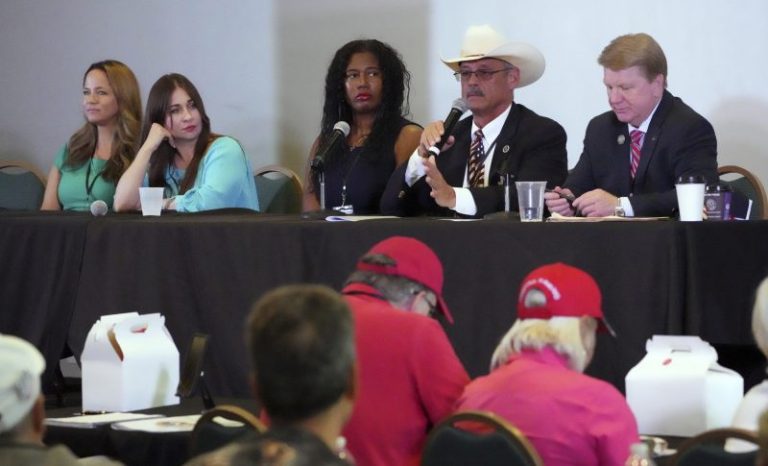On Tuesday, 2020 election deniers will appear up and down the ballot virtually everywhere. Within this slate of candidates, there are gradations of denialism and varying levels of potential impact.
High on the list of where these candidates could matter most? In several secretary of state races in key states, the GOP nominee is an election-denial hard-liner who could soon exercise control over those states’ elections.
The good news for Democrats and others who fear what that might portend: Polls show virtually all of these GOP candidates are lagging fellow Republicans who are running on the same ticket.
That doesn’t mean they can’t win, and some of them appear to have a real chance. But if many do, it may be because they were swept up in a GOP wave that carried other extreme candidates across the finish line, too.
New polling this week from the New York Times and Siena College appears to reinforce that these secretary of state candidates could cost the GOP winnable races.
In Nevada, Jim Marchant — the head of the America First Secretary of State Coalition, which includes the most hard-line election deniers — trailed in his race by four points. He did so even as the Senate race was deadlocked and the GOP led in the governor’s contest by four points.
In Arizona, fellow coalition member Mark Finchem trailed by seven points. That’s similar to the six-point deficit of Blake Masters, an unpopular Senate candidate, but worse than the tied race for governor. And another poll this week showed Finchem trailing by six points and lagging GOP margins in those other races by four and eight points, respectively.
The Times/Siena polling showed that voters favored Republicans on the generic ballot, but that the GOP secretary of state candidates still trailed.
Finchem’s numbers are particularly striking, given that earlier polling (including from one of the same pollsters) had actually shown him running ahead of his ticket-mates at the time.
The story is similar in Michigan, where two recent polls show GOP secretary of state nominee Kristina Karamo trailing by nine and 10 points — even as other statewide races, including the governor’s contest, were within the margin of error.
Karamo has spread numerous false election claims stemming from her time observing the 2020 vote-counting process at the TCF Center in Detroit — claims she leveraged to win the GOP nomination as a political neophyte. She is also in the America First Secretary of State Coalition.
Perhaps the other highest-profile member of the coalition running for secretary of state is New Mexico’s Audrey Trujillo. But polling this week for the Albuquerque Journal shows Trujillo trailing by 15 points — again, worse than three other GOP candidates for statewide office.
A fifth member of the coalition isn’t actually running for secretary of state, but rather for governor: Pennsylvania’s Doug Mastriano. (In the Keystone State, the secretary of state isn’t elected but is appointed by the governor.) And similar to the other candidates, virtually every recent poll shows Mastriano significantly lagging the GOP’s Senate nominee, Mehmet Oz. Mastriano trails by 10 points in the FiveThirtyEight average and has been largely left for dead by his party.
A final race of note is in Minnesota. GOP secretary of state nominee Kim Crockett isn’t in the America First coalition, but she has said the 2020 election was rigged and has promoted Dinesh D’Souza’s overwhelmingly debunked film about purported voter fraud, “2000 Mules.” A poll two weeks ago showed her trailing by seven points, even as two other statewide races were tied and the GOP trailed in the governor’s race by five.
These polls come with all the necessary caveats: Polling has proved difficult in this day and age, and that goes double when you’re surveying down-ballot races about which people might not have heard very much and when there isn’t much quality polling to compare. And as we’ve written previously, polarization is much higher than in past elections — so it seems likely in secretary of state races (which are generally lower-profile) that voters’ party affiliation will win out over any feelings they may have about the candidates.
But Democrats have made these races a priority, spending significantly more to fund their candidates’ campaigns and run ads for them, with several of these election deniers struggling mightily to raise money. For example, Finchem is being outspent 40 to 1, The Washington Post reported this week.
In addition, even if the polls turn out to be off, the relative performances of the GOP candidates could be instructive. And the underperformances of these secretary of state candidates appears consistent across the board, albeit to varying degrees.
And if these candidates do lose while their ticket-mates win, that might say something about how palatable voters find their brands of denialism.

